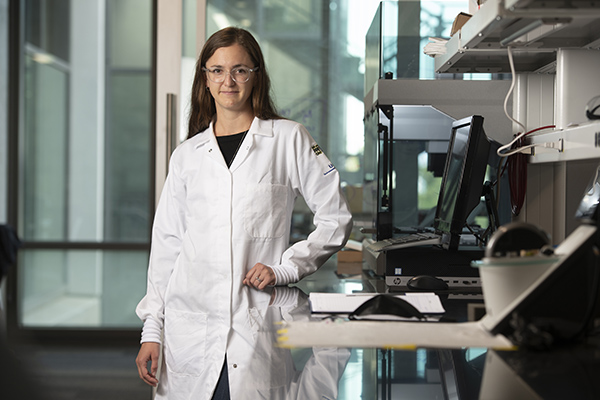Copp Wins DOE Early Career Award for Solar Energy Research

Stacy Copp wins an Early Career Award from the DOE for her nanocluster-based materials research. Steve Zylius / UC Irvine
Sept. 11, 2024 - The U.S. Department of Energy has selected Stacy Copp, assistant professor of materials science and engineering, for an Early Career Research Program award. Funded by the DOE Office of Basic Energy Sciences, the five-year $875,000 grant will support Copp’s research into the development of nanocluster-based materials for critical applications in solar energy harvesting and solar fuels.
Copp’s lab develops new nanomaterials to control and manipulate light. To create these materials, her group takes a bioinspired approach, using Nature's DNA and biomimetic polymers as architectural tools for complex, self-assembling nanomaterials that cannot be made by conventional approaches.
With the DOE funding, Copp will investigate a new class of nanoscale materials that could mimic the light-harvesting abilities of plants and other organisms. According to Copp, a significant body of theoretical work has shown the promise of metal nanoclusters for increasing the efficiency and range of resonance energy transfer, which is a key step in harvesting solar energy. However, experimental studies to verify these predictions have been hindered by the major challenge of creating well-controlled nanoscale architectures of nanoclusters. This research overcomes this long-standing challenge by harnessing new capabilities in bioinspired programmable assembly of DNA-stabilized nanoclusters.
“This fundamental scientific study of energy transfer processes in nanocluster materials is motivated by the urgent need for cleaner, more efficient ways to harness the Sun’s energy,” said Copp. “Our current wildfire season is one poignant reminder of the importance of addressing the urgency of climate change. We are truly grateful for DOE’s support of our science.”
The Early Career Research Program awards are part of the DOE’s longstanding efforts to develop the next generation of STEM leaders and solidify America’s role as the driver of science and innovation around the world. Copp is among 91 early career scientists from across the country who will receive a combined $138 million in funding for research covering a wide range of topics.
– Lori Brandt
